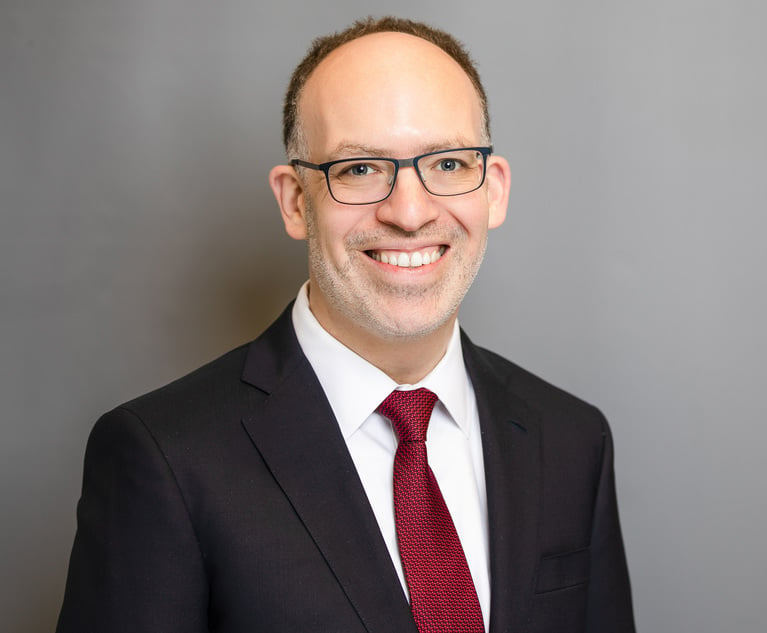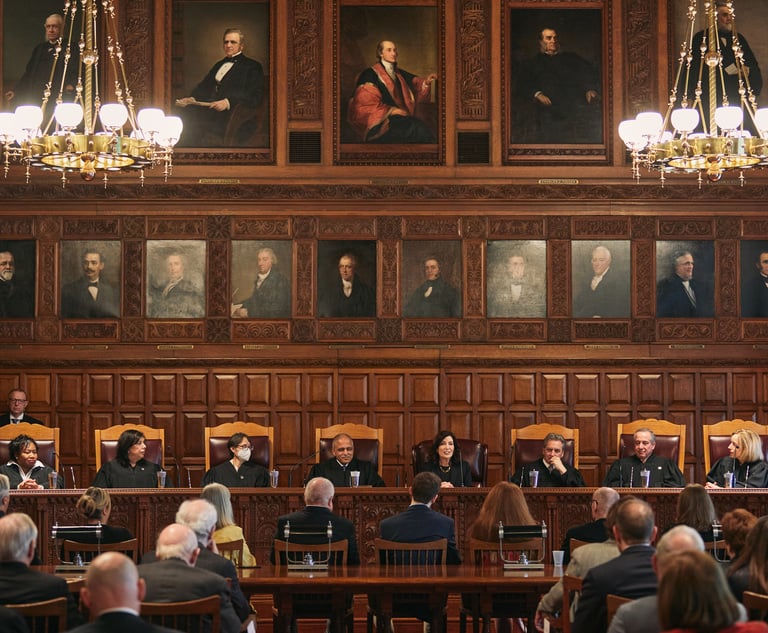Rethinking Old Messages To Support Better Mental Health
To truly address the root causes of why lawyers are depressed, stressed, anxious and less than fulfilled professionally, there must be fundamental structural and transformative change throughout our profession.
February 04, 2020 at 11:00 AM
7 minute read
 (Credit: Shutterstock)
(Credit: Shutterstock)
When I was a very new lawyer almost 29 years ago, I heard it said that being a good lawyer is about not messing up. Perhaps you have heard one of the following statements, or something similar, in your years of practice:
- At the end of the day, lawyers are fungible;
- Mistakes are unacceptable.
- You'll never make partner unless …
- If you didn't want to be available 24/7, you should have chosen another profession.
- This is critically important to the client … but don't bill too much time to it.
- Never show weakness at your job, and especially not to your adversary.
Faced with the implications of these types of statements, and the many other pressures to develop business, become an expert in a specific practice area, and collect as much revenue on your time as possible, is it any wonder that the mental and physical stress that lawyers experience leads to high rates of depression, alcoholism, failed relationships, and unhealthy levels of anxiety?
The good news is that our profession clearly recognizes these issues. That is the first step towards fundamental change. The better news is that many firms—either as participants in the ABA's Well Being Pledge or independently—are taking significant steps to address these issues. For example, some firms provide services like on-site yoga, meditation, counseling, mental health seminars. My own firm recently completed a major renovation that includes a beautiful, natural light filled gathering space to eat lunch, have a cup of gourmet coffee with a colleague or a client, play ping pong, or simply relax and regroup on a comfortable couch. We even have a yoga room and offer healthy snack options including fresh fruit, hummus, yogurt and nuts. These important changes have, in many ways, rejuvenated how our lawyers and staff think and feel about our work lives. Additionally, as a firm we continue to place a high value on pro bono and community service work, which allows us to understand we have broader responsibilities to each other and to society at large than just law.
To truly address the root causes of why lawyers are depressed, stressed, anxious and less than fulfilled professionally, there must be fundamental structural and transformative change throughout our profession. Read on to uncover some of the law industry's most overheard assertions, and how we can rework these messages to support better mental health for each other and brighter futures for our firms.
At the end of the day, lawyers are fungible. Really? Are lawyers fungible? Are human beings fungible? Of course not. But that is too often a message delivered to many lawyers—especially those early in their careers. Those same lawyers internalize that message and constantly wonder if they are good enough, smart enough, working hard enough, or whether they are on the brink of being replaced. Practicing law well is hard enough. We must start with the premise that we all have something to bring to the table. We are not easily replaceable because we have unique traits, backgrounds and experiences that inform our ability to be great lawyers, good citizens and outstanding client advocates. Let's begin by allowing everyone the freedom to contribute to our profession and our workplaces by embracing who they are.
Mistakes are unacceptable. There is a lot of pressure to be perfect—especially at the rates we charge our clients. But is that a reason we must fear making a mistake? Of course not. Everyone—including whoever you would identify as the best lawyer you know—makes mistakes. The stress caused by the demand for perfection is simply unhealthy and counteracts our ability to become great practitioners. Creative legal arguments, innovative legal solutions, and better outcomes can only be achieved if we are able to practice freely, think broadly and give what may be deemed to be non-traditional advice—even at the risk of making mistakes.
You'll never make partner unless … Think about that statement for a minute. Talk about negative reinforcement. Indeed, some argue that the next generation of lawyers is less concerned—and less interested—in joining law firm partnership. We must realize this negative reinforcement may prevent individuals from growing into the type of firm figureheads that are fit for partnership, potentially creating a dark future for those who will eventually lead our firms.
If you didn't want to be available 24/7, you should have chosen another profession. Given the stresses that we know members of our profession suffer, is that a reasonable expectation? Do legal questions always require immediate answers? Of course not. Are there actual emergencies that require immediate attention? Absolutely. The problem is that our profession has created the expectation and the anxiety that we are or need to be Supermen and Superwomen day and night. For the majority of lawyers, this contributes to a demoralizing feeling that their time is not their own. Do our professional responsibilities require us to be responsive to our colleagues and clients? Absolutely. Should we do a better job of educating ourselves and our clients about realistic expectations? Absolutely. Should we communicate with our clients to let them know when they can expect our best response and our best work product? Absolutely. But we should not feel that our only choice to have a work/life balance is to leave this great profession.
This is critically important for the client … but don't bill too much time to it." We all want to do the best work that we can to help our clients. However, many feel the constant pressure to do a great job for the client but not to bill the client too much for fear of losing the relationship. This creates another mixed message, internal conflict and ultimately more anxiety. We must do a better job of communicating client needs as well as being transparent with our clients about anticipated legal fees. We must improve how we train new lawyers on what it means to do a great job for a client, how long that process realistically takes and how to deliver high quality legal work without destroying our mental and physical well-being.
Never exhibit weakness at your job, and especially not to your adversary. Let's face it—our profession frowns upon acknowledging mistakes or exhibiting vulnerability. We must permit each other to accept that we are human and, most of the time, recognize we are doing the best that we can. Most of us care deeply about our clients and the challenges that they face, want the very best outcome for our clients and care about our colleagues. What would it look like if we spread that care to other lawyers—including our adversaries? If we choose not to shift the paradigm quickly, our colleagues, friends, and adversaries will continue to suffer.
Despite the challenges we face as a profession, there is hope. As a law school adjunct professor, I have the privilege of meeting a new group of students every year. They are bright, motivated and possess the emotional intelligence that will allow them to reject the pressure, stress, and perfectionism that has plagued our profession for years. They are prepared to leave a job—or even the profession—if we do not begin to make transformative change. We cannot afford to lose them, and we cannot afford to lose ourselves.
Wishing everyone good health.
Edward Shapiro is co-chair of the litigation and dispute resolution Group at Much Shelist, P.C., where he also leads the diversity and inclusion working group. He is also an adjunct professor at Northwestern University Pritzker School of Law, where he teaches Negotiation in the Center on Negotiation and Mediation.
This content has been archived. It is available through our partners, LexisNexis® and Bloomberg Law.
To view this content, please continue to their sites.
Not a Lexis Subscriber?
Subscribe Now
Not a Bloomberg Law Subscriber?
Subscribe Now
NOT FOR REPRINT
© 2025 ALM Global, LLC, All Rights Reserved. Request academic re-use from www.copyright.com. All other uses, submit a request to [email protected]. For more information visit Asset & Logo Licensing.
You Might Like
View All

The Power of Student Prior Knowledge in Legal Education
Law Firms Mentioned
Trending Stories
- 1'It's Not Going to Be Pretty': PayPal, Capital One Face Novel Class Actions Over 'Poaching' Commissions Owed Influencers
- 211th Circuit Rejects Trump's Emergency Request as DOJ Prepares to Release Special Counsel's Final Report
- 3Supreme Court Takes Up Challenge to ACA Task Force
- 4'Tragedy of Unspeakable Proportions:' Could Edison, DWP, Face Lawsuits Over LA Wildfires?
- 5Meta Pulls Plug on DEI Programs
Who Got The Work
Michael G. Bongiorno, Andrew Scott Dulberg and Elizabeth E. Driscoll from Wilmer Cutler Pickering Hale and Dorr have stepped in to represent Symbotic Inc., an A.I.-enabled technology platform that focuses on increasing supply chain efficiency, and other defendants in a pending shareholder derivative lawsuit. The case, filed Oct. 2 in Massachusetts District Court by the Brown Law Firm on behalf of Stephen Austen, accuses certain officers and directors of misleading investors in regard to Symbotic's potential for margin growth by failing to disclose that the company was not equipped to timely deploy its systems or manage expenses through project delays. The case, assigned to U.S. District Judge Nathaniel M. Gorton, is 1:24-cv-12522, Austen v. Cohen et al.
Who Got The Work
Edmund Polubinski and Marie Killmond of Davis Polk & Wardwell have entered appearances for data platform software development company MongoDB and other defendants in a pending shareholder derivative lawsuit. The action, filed Oct. 7 in New York Southern District Court by the Brown Law Firm, accuses the company's directors and/or officers of falsely expressing confidence in the company’s restructuring of its sales incentive plan and downplaying the severity of decreases in its upfront commitments. The case is 1:24-cv-07594, Roy v. Ittycheria et al.
Who Got The Work
Amy O. Bruchs and Kurt F. Ellison of Michael Best & Friedrich have entered appearances for Epic Systems Corp. in a pending employment discrimination lawsuit. The suit was filed Sept. 7 in Wisconsin Western District Court by Levine Eisberner LLC and Siri & Glimstad on behalf of a project manager who claims that he was wrongfully terminated after applying for a religious exemption to the defendant's COVID-19 vaccine mandate. The case, assigned to U.S. Magistrate Judge Anita Marie Boor, is 3:24-cv-00630, Secker, Nathan v. Epic Systems Corporation.
Who Got The Work
David X. Sullivan, Thomas J. Finn and Gregory A. Hall from McCarter & English have entered appearances for Sunrun Installation Services in a pending civil rights lawsuit. The complaint was filed Sept. 4 in Connecticut District Court by attorney Robert M. Berke on behalf of former employee George Edward Steins, who was arrested and charged with employing an unregistered home improvement salesperson. The complaint alleges that had Sunrun informed the Connecticut Department of Consumer Protection that the plaintiff's employment had ended in 2017 and that he no longer held Sunrun's home improvement contractor license, he would not have been hit with charges, which were dismissed in May 2024. The case, assigned to U.S. District Judge Jeffrey A. Meyer, is 3:24-cv-01423, Steins v. Sunrun, Inc. et al.
Who Got The Work
Greenberg Traurig shareholder Joshua L. Raskin has entered an appearance for boohoo.com UK Ltd. in a pending patent infringement lawsuit. The suit, filed Sept. 3 in Texas Eastern District Court by Rozier Hardt McDonough on behalf of Alto Dynamics, asserts five patents related to an online shopping platform. The case, assigned to U.S. District Judge Rodney Gilstrap, is 2:24-cv-00719, Alto Dynamics, LLC v. boohoo.com UK Limited.
Featured Firms
Law Offices of Gary Martin Hays & Associates, P.C.
(470) 294-1674
Law Offices of Mark E. Salomone
(857) 444-6468
Smith & Hassler
(713) 739-1250








